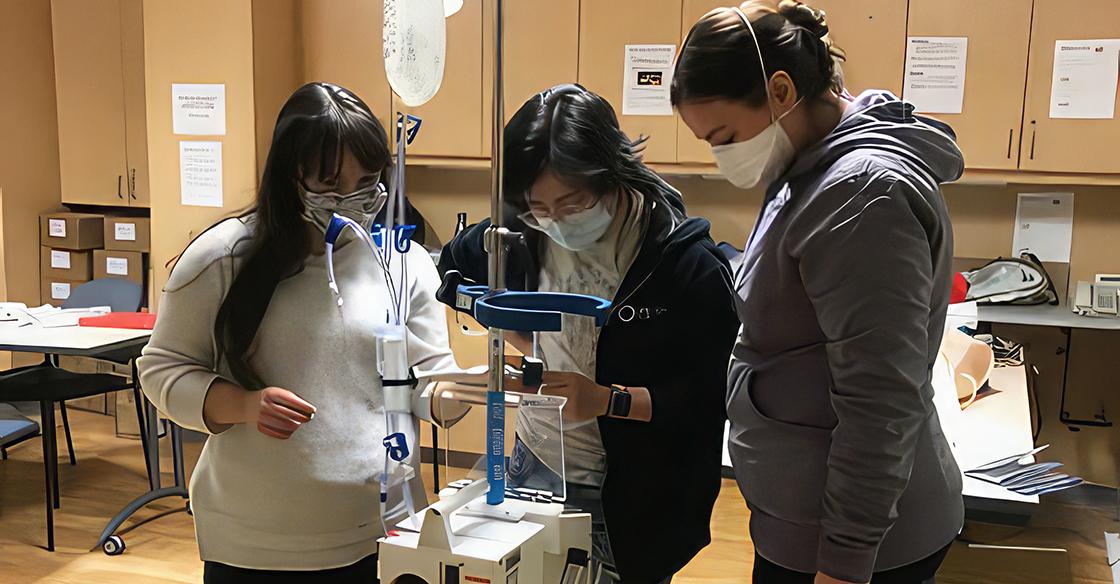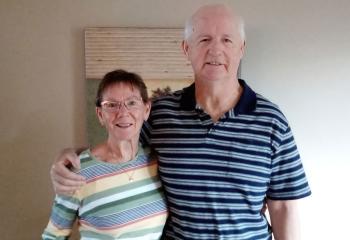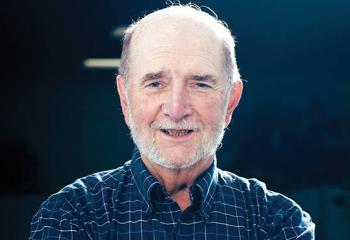
From left to right: QEII registered nurses Noelle Ozog, Xiaoqi Zhu and Heather Parsons receive training on the new Belmont Rapid Infuser system in the QEII Emergency and Trauma Centre. PHOTO CREDIT: Contributed
In trauma situations, every second counts.
As the tertiary trauma centre for Nova Scotia, the QEII’s Charles V. Keating Emergency and Trauma Centre sees approximately 200 visits daily and has the highest volume of trauma patients in the province. Here, QEII staff and physicians work in high-stress, high-stakes situations, delivering the highest quality of care to patients.
Now, thanks to the late Anjna Majhail, a loyal QEII Foundation donor who left a gift in her will to support health care, new state-of-the-art technology will help healthcare teams deliver the most advanced patient care during trauma situations.
The Belmont Rapid Infuser has a very specific, critical task — it rapidly delivers lifesaving, warmed blood products and fluid at the touch of a button.
Haley Avery is a clinical nurse educator at the QEII’s Emergency and Trauma Centre. She says acquiring this machine is a game-changer for registered nurses working in the high acuity pod at the Emergency and Trauma Centre. This team cares for patients requiring resuscitation following a traumatic incident like cardiac or respiratory arrests, or who need a large volume of blood because of a hemorrhage.
“These are the sickest patients in the province,” says Haley. “Having access to a new Belmont Rapid Infuser will directly impact these patients.
"When facing life-threatening situations, you want to know you have the most advanced, functional equipment at your fingertips for your patient.”
And as the name suggests, the Belmont Rapid Infuser also means patients receive transfusions quicker. Haley estimates that the team can infuse blood into a patient within two minutes of arrival instead of five or six minutes. Haley also notes that another key benefit is that the infuser warms fluids being administered to a patient.
“The warming is crucial so we’re not giving patients high volumes of cold fluids. Because of the nature of their traumatic injuries, these patients are at a higher risk of developing hypothermia. If they become hypothermic, the situation can rapidly deteriorate,” she explains.
Currently, the QEII Emergency Department has two rapid infusers, but the older technology is cumbersome. The machines are not user-friendly, which limits training opportunities. Since the Belmont Rapid infuser arrived in March 2023, Haley has been working with her colleagues to ensure each of the 70 registered nurses working in the high acuity pod is trained.
“We consulted trauma experts and leading emergency physicians and read plenty of research to ensure we were getting the best technology, and we’re thrilled it’s finally here,” she says.
In addition to enhanced patient care, the Belmont Rapid Infuser will also benefit the team. As with most healthcare teams, the COVID-19 pandemic brought challenges.
“During COVID, the challenges we’ve experienced in the emergency department have been enormous. That’s difficult for frontline healthcare teams. So having access to new technology like the Belmont Rapid Infuser removes some of the barriers we’ve faced and ensures we’re focused on what’s most critical — providing the best patient care we can,” she says.
“Accessing new and innovative technology can be cost-prohibitive. We’re so grateful that after years of having the Belmont Rapid Infuser on our wish list and doing lots of research, it’s finally here. We’re grateful for the donor’s incredible generosity, which provided this critical piece of equipment.”
Throughout her lifetime, Anjna generously supported many areas of the QEII from neuroscience to heart health to cancer care. She also previously gave to the QEII emergency department, naming an emergency patient care room in memory of her late parents.
For Geoff Graham, a charitable giving advisor with the QEII Foundation, it’s a wonderful example of how estate gifts directly impact health care and patients.
“Anjna was an extremely generous QEII donor who believed in the value of investing in health care. Now, through her legacy gift, she continues to make a difference and will help patients during their most difficult times.”

